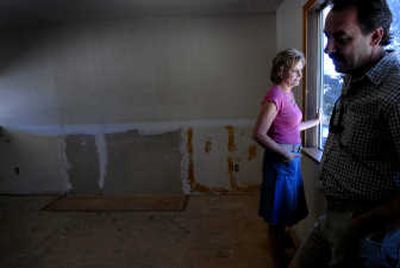Cleaning up after meth

Just blocks from a North Idaho school, a split-level house blends in with its neighborhood.
But the inside is bare. Crews this summer removed tons of debris from the home, stripping the carpet, the ventilation system and even the kitchen sink — all to clear out residue from the meth former occupants cooked there.
Meth Lab Cleanup LLC of Post Falls decontaminated the house, one of about 30 projects the company and its subcontractors remediate monthly nationwide.
“You couldn’t walk through this house,” said Joe Mazzuca, who owns the company with his wife and company founder, Julie. “The boxes and stuff were stacked up to the ceiling, every room in this house. It was unbelievable. And we find that about 50 percent of the time.”
Capitalizing on growing public awareness nationwide of clandestine drug labs, and the health risks they may pose to building dwellers, the four-year-old company specializes in cleaning up meth labs, and business is growing. The couple also runs a national training program for health officials and cleanup contractors, and Washington recently approved them to train state-certified contractors.
Meth production involves potentially volatile chemicals that can leave hazardous residues. Cooking coats surfaces with oily residue, and airborne dust particles can spread it, Joe Mazzuca said. The company tests dwellings before and after cleaning and produces what it boasts are “legally defensible” documents certifying them clean.
And the Mazzucas claim an exclusive agreement to test chemicals and equipment designed to clean up nuclear and chemical attacks for meth-lab cleanup. They plan to develop and sell the technology if tests succeed. The company could see millions of dollars in revenues in the first year of expanded operations, Joe Mazzuca said.
“Julie started this business with big dollar signs in her eyes, and believe me, those dollar signs are just coming,” he said. “But once we got involved on it and started, almost every home we go into there’s children’s clothes and toys and everything, and we became very passionate about being a resource and a solution.”
The Mazzucas estimate there are 2.5 million meth lab sites in the U.S., most of them contaminated. And the majority of homes the company cleans were not reported to authorities, Julie Mazzuca said. Landlords sometimes will try to paint or remodel instead of cleaning up, they said.
Both Washington and Idaho law forbids living in certain meth lab sites discovered by authorities until the property is cleaned or demolished.
While meth lab busts in some states are declining, increasing state regulations drive the firm’s business. There are no national standards for cleanup, Joe Mazzuca said, but about 15 states have adopted rules. Some of those, including Washington, mandate less than .1 micrograms of meth residue per 100 square centimeters of space — comparable to a packet of coffee sweetener spread evenly over two football fields, he said.
The company has cleaned dwellings ranging from mobile homes to houses in Montana that required a snowmobile trip, but most company clients are large management firms and federal housing agencies, Joe Mazzuca said.
Meth Lab Cleanup charges roughly $4,700 to $5,700 to cleanup a three-bedroom, 1,500-square-foot house in Idaho, but their work in other states can cost more, Joe Mazzuca said.
Cleanup of clandestine drug labs costs an average of $6,500 for a 1,200-square-foot home in Washington, according to the state Department of Health.
Bill Coye, owner of Tulsa, Okla.-based Apex BioClean, said he took the Mazzuca’s course in Nashville because “what they’re doing works.” Like some other trainees, he’s since worked as a subcontractor for Meth Lab Cleanup.
“The molecule itself is so indestructible that meth addicts now are actually saving urine,” because the body doesn’t metabolize all of it, Joe Mazzuca said. “We’ll actually go into meth labs and we’ll find five-gallon buckets of human urine.”
He added: “A lot of companies that get into this business don’t realize the potential to fail because they don’t understand the migratory potential for this type of contamination.”
Cleanup rarely requires stripping a house completely, Joe Mazzuca said. Workers wearing respirators and Tyvek suits spray “copious amounts” of chemicals on contaminated surfaces and use a wet vacuum to remove them.
The new chemicals being tested, however, can be sprayed on, left to dry and vacuumed off, Joe Mazzuca said. A machine being tested could enable crews to remove layers of paint to expose contaminants, preventing workers from needing to gut houses.
Greg McKnight, a public health adviser for the Washington Office of Environmental Health and Safety, said the dangers of labs remain unknown, but pose potential neurological effects.
Immediate effects of exposure to residue include eye and skin irritation, shortness of breath and general lethargy, said Coye, a registered nurse and paramedic.
Children especially may feel sick, and small pets sometimes die, said Julie Mazzuca, who worked for Department of Defense and Department of Energy for nearly two decades.
The trick will be deciding which portion of the business to focus on, said Hank Artis, North Idaho representative for Idaho TechConnect. He urged the Mazzucas to participate in a recent Idaho business plan competition, where they won a people’s choice award.
“What I liked was, of course, they were getting ahead of the parade instead of following it,” Artis said.